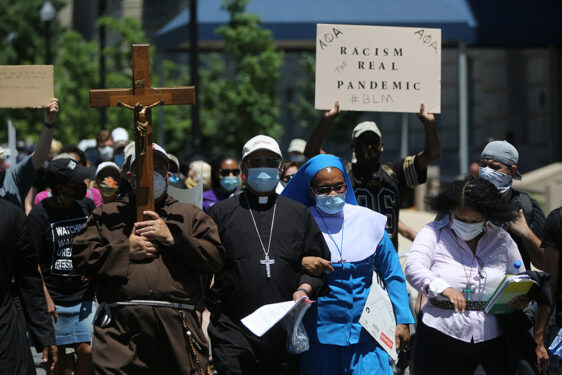By Rhina Guidos
WASHINGTON (CNS) — When the U.S. bishops decided to continue with their annual fall meeting despite a pandemic, they took it online, shortened its length but also its scope, leaving only the most essential matters on the to-do list.
And at the U.S. Conference of Catholic Bishops 2020 fall meeting, racism was part of that essential business.
As U.S. cities and towns across the country clamored for justice this summer following more killings of Black men and women at the hands of authorities, there was hardly a diocese that wasn’t touched by widespread calls against racism.
Bishop Shelton J. Fabre of Houma-Thibodaux, Louisiana, who is chair of the USCCB’s Ad Hoc Committee Against Racism, reminded the group gathered online that as a body of bishops they approved in 2018 a document on racism, “which among many other things unequivocally declares that racism is a life issue,” he said Nov. 17, the last day of the two-day online meeting.
It certainly was a life issue for Bishop Mark J. Seitz of El Paso, Texas, who recalled how a racially motivated mass shooting in his diocese left 23 people dead and as many injured.
Authorities said the suspected gunman who opened fire targeted Latinos at a Walmart in El Paso Aug. 3, 2019, and had been looking to shoot “Mexicans.” He allegedly wrote a manifesto that spoke of the “Hispanic invasion” of Texas.
“It really brought home the fact that white supremacy is not a harmless fringe ideology but that it is death-dealing ideology,” said Bishop Seitz, speaking to the bishops gathered online. “And it also reminded us that words matter. Words that denigrate immigrants and other people of color really matter and feed into these ways of thinking.”
Other bishops spoke of racism in its various forms in their respective communities.

Bishop Larry Silva of Honolulu spoke of the racism Micronesian migrants in Hawaii face, working at essential jobs during the pandemic but receiving little economic benefit.
That circumstance also has put them at-risk because many have infected their families since they have to work as well as risk exposure and can’t afford homes where members can isolate while they have the virus, he said.
“To think that (some) people can be (considered) expendable,” he said.
Many such communities fly under the radar, “and I think sometimes that can be a problem that we don’t notice,” Bishop Silva said, reminding prelates to look around their communities for those who might be facing such issues.
Bishop Fabre spoke of events that, after the summer of 2020, could no longer be ignored or were no longer flying under the the public eye’s radar.
“We could watch on the screen numerous killings of African Americans and that these killings would spark worldwide peaceful demonstrations and protests,” he said, as well “reprehensive” violence in some places.
COVID-19, too, has highlighted the disparities among communities of color by the sheer devastation of their populations it has caused, he said.
Bishop Jaime Soto of Sacramento, California, said that while many dioceses and parishes may want to address the topic, it’s not always easy.
“I would have to say that a very common experience was that there was resistance in many parishes and schools to introduce this topic about racism,” he said. “The common idea was that somehow … we were over this issue or that it wasn’t really important.”
[Related: Bishops’ Anti-Racism Ad Hoc Committee Up for Reauthorization]
